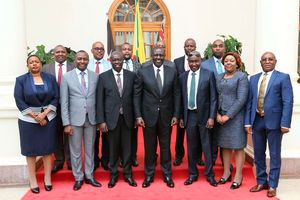
A view of State House in Nairobi.
Political leaders at both the national and county level of government often feel compelled to prove that they are working. One way of doing so is by generating positive media as they “launch” various programs and projects.
Another is to generate media talking tough at an errant group, real or imaginary. Whichever variety, it helps to label them ‘cartels’.
Launching can take the form of a flag off. For instance, you will often see a governor flagging off a consignment of drugs for distribution to the health facilities. Food relief is the worst hit. Whether responding to drought or floods, government gathers trucks, often at State House, for the Head of State to flag off. Subsidized fertilizer is not far behind.
Flag offs are not only super inefficient and wasteful, they reinforce an obsession with inputs as a way of demonstrating work. Most formal reports, not just by departments and treasuries but including those by oversight organs such as Parliament, Controller of Budget and Auditor General focus on the money budgeted or spent. And while a necessary condition, a pile of money is not sufficient for true and lasting benefits to accrue to the citizen.
The first step in getting there is implementation. And governments are woefully poor at project completion. The CoB first fiscal quarter report made headlines recently, when it emerged that as many as 10 counties had not booked a single shilling in development expenditure during those three months.
But even when implementation is flawless, governments have to put in serious work to obtain a change in behavior of the target beneficiaries. To improve maternal health, it is not enough to build maternity facilities at the dispensaries. You have to persuade the population to use them. In some areas the traditional birth attendant is compensated by the family for her duties, income lost if her client instead chooses to deliver in a facility.
But impacts are enduring. This brief column on economic matters is an impact, first of Mrs. Mangichu who taught me the English language in lower primary. That others built on it over time is certain, but she laid the foundation. Then there was Mr. Billings, Mr. Manyuera, and Mr. Kamotho, who succeeded her for the middle years. It was on this foundation that Dr. Salah El Sheik and his colleagues would later build on, as they proclaimed micro and macro-economics, as well as statistics and econometric analysis.
Impacts continue long after the work has been done. And are never linear. When Mrs. Mangichu taught me English in lower primary, it was not just so that years in the future, I would write a column on economics. Rather she implanted a competence that I use in all facets of my life.
Compare her work with the behavior of political leaders. Had she been running for office – say school teacher for lower primary – would she have “launched” her standard two class every beginning of term – in order to show that she was working?
The rush to be seen to be working can lead to embarrassing moments. Such is the case with the visa-free big announcement by the president. It turns out that the visitor identification system to replace traditional visa is not ready. Such is the case with the launching of roads. After the embarrassing Nyandarua incident where the president launched a road for a record third time, the practice has slowed down.
So desperate are the Cabinet Secretaries for anything, any project or program that can be launched, that in the last 16 months they have been bombarding departments, parastatals and development partners alike.
Such was the case with the launch of the community health volunteers’ (CHV) program. An excellent innovation for primary health, this strategy is not new. I first encountered it during Kibaki II. Often the best ideas are simple, elegant and straight forward.
This is one such. A trusted person with some knowledge of health issues can greatly assist the rest of her community to achieve vastly improved health outcomes. After all, primary health is often about the level of hygiene and sanitation. A clean homestead, clean food and clothing, a pit latrine and so on, are all the first line of defence against disease.
Much later, while serving as governor in Laikipia, we built on this idea to achieve what folks thought amazing – 63 per cent of the population with health insurance. How? With Amref Africa and IBM, we developed m-jali, a mobile app for NHIF registration.
Now when the CHV visited a homestead, they could register them with NHIF on the spot. And since the app was integrated with mobile payments, the newly registered member could settle her dues directly. At that point NHIF had agreed to lipa mdogo mdogo, so the member did not have to have the entire monthly amount and could pay as little as Sh20.
It was amusing to see this regime now launching the CHV program. A cheeky, if clever, bureaucrat at Afya house must have informed the Cabinet Secretary that the program had never been launched!
So impatient is this regime for accolades that they routinely create their own. You might recall that by early 2023, they had begun announcing that they had stabilized the economy. Unfortunately, you cannot stare inflation down. And if you are not managing the economy well, the exchange rate will betray you.
Outcomes and impacts are non-partisan. Even the harshest critics of the Nairobi Expressway still use it, thankful that they can now dash to the airport to catch their flights on time. Happy that as their government issue SUVs thunder down the expressway, they can send out one quick Uhuru insult on social media.
@NdirituMuriithi is an economist







